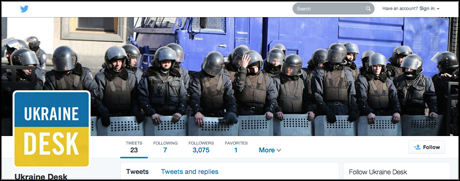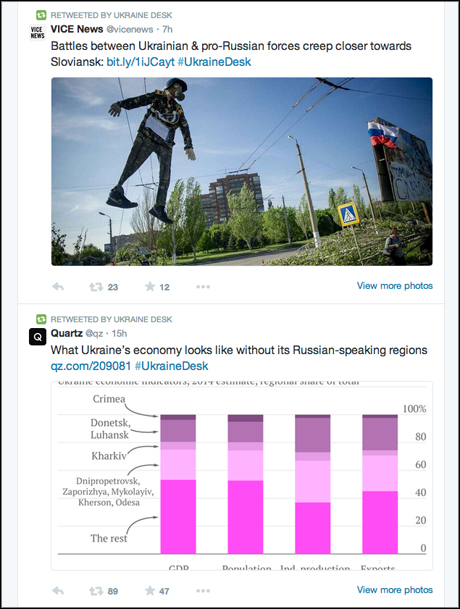
On Tuesday, Vice News announced a new, collaborative project with five other digital news outlets to pool their coverage of the Ukraine crisis around one hashtag and re-distribute it from an independent Twitter account.
Ukraine Desk – involving Vice News, Quartz, Mashable, Mother Jones, Digg and Breaking News – is publicly billed as a low-cost experiment in digital collaboration as the "institutions of journalism become more porous", Monika Bauerlein, co-editor of Mother Jones, told Journalism.co.uk.
"Historically we've thought of the best journalism happening when we're all competing and none of us knows what the other is doing," Bauerlein said, but because of the complexity of the situation in Ukraine, that kind of approach "doesn't make sense any more".
This view is shared by Vice, where head of platform and adjunct professor of journalism at Stanford and Columbia universities Drake Martinet recognises the new opportunities that digital media can afford to news outlets working on large stories.

Screenshot from @UkraineDesk
"Vice News is trying to do the very best job we can to do the rolling coverage of Ukraine that we were focussed on," Martinet told Journalism.co.uk, "but we also knew that there was great original coverage coming from a lot of different organisations."
By pulling together "interesting and distinctive" outlets around a common goal, Martinet said the Ukraine Desk project would make readers "better consumers of information".
"Ultimately you end up with a larger group of people who are better informed than they were before," he said, "and that's great."

Screenshot from @UkraineDesk with stories from Quartz and Vice
But why Ukraine? Why not another story?
"It sits at that sweet spot of a story that, on the one hand, has a good size of audience and interest and people do care about what's happening," said Bauerlein, "but it's not so overwhelming that it takes up a lot of your content stream."
Bauerlein and Mother Jones have experience in collaborative projects from their Climate Desk experiment with the Guardian, the Atlantic, Slate, The Huffington Post and more.To pretend that people are not assembling their buffet of news from all of our organisations, and that we're not sharing an audience anyway, would be naïveMonika Bauerlein, Mother Jones
Climate Desk – "a wonderful experience" said Bauerlein – has been running since 2009, with little concern over "exposing the core audience" to a different brand with some similarities.
"In fact we looked at it as a plus," she said. "People are capable of walking and chewing gum at the same time and they're also capable of reading Mother Jones and Quartz and Digg at the same time and in fact people wouldn't have it any other way.
"To pretend that people are not assembling their buffet of news from all of our organisations, and that we're not sharing an audience anyway, would be naïve."
"The internet, especially for media, is not a zero sum game," agreed Martinet, and although some "members of the group would like to do a lot more" the focus for now is on experimenting with a low-cost, low-risk approach to collaboration that could have a multitude of outcomes.
"So maybe the outcome is that there's some traffic and maybe that outcome is smarter consumers," he said, "maybe it's coverage that swarms around a given story and gives people multiple sides and more perspectives. All those could be outcomes and I think we're excited to see what could happen."What are the things which leading, new guard, digital media companies can do together to improve coverage and better serve their community?Drake Martinet, Vice
The unknown nature of the project is one of the most exciting aspects of it though, said Bauerlein, in that it can develop in much the same way as the news story itself and evolve in the continuing digital ecosystem, adapting where necessary.
The prospect of covering other stories in a similar way has already been discussed, Martinet said, and if Ukraine Desk works in a "successful, positive way" then there are "all kinds of interesting things that organisations like ours could do together".
"Those conversations are exactly what we hoped to get started," he said. "What are the things which leading, new guard, digital media companies can do together to improve coverage and better serve their community?"
Free daily newsletter
If you like our news and feature articles, you can sign up to receive our free daily (Mon-Fri) email newsletter (mobile friendly).
Related articles
- 200 speakers you need at your next journalism event to avoid all-male panels
- Kyiv Independent launches an English-speaking journalism school
- Ukrainian journalists use smartphones to tell stories of displaced communities
- Mobile journalism in Ukraine, with Robb Montgomery
- Newsrewired special: Thinking of audience trust as a marketing problem









